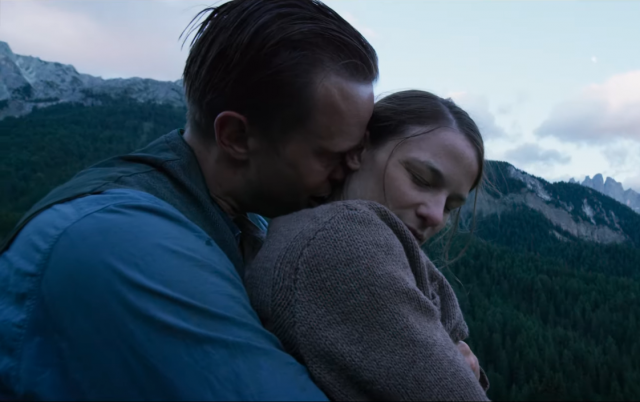TIFF 2019: A Hidden Life, by David Bax

Terrence Malick’s transcendent A Hidden Life is informed and bolstered in every way by Christian philosophy and yet, despite including numerous men of cloth as characters, none of them has the fortitude to fulfill the purpose of their vocation. But one of them (played by Tobias Moretti) does at least offer us a means of interpreting Malick’s intentions when he mentions that each of us would like to imagine ourselves opposing Christ’s crucifixion were we alive and present at the time. We have no way of knowing how we will react to such a situation until we are tested but history tells us that most fall short. Here is a true story of a man who passed that test. Malick’s previous film, Song to Song, was exhilarating and transporting but suffered slightly from Malick’s distance from his subjects and their milieu. But, with Franz Jägerstätter, Malick has found someone he believes in.
Jägerstätter was an Austrian farmer who refused to pledge the required oath to Adolf Hitler upon his military conscription. In A Hidden Life, August Diehl plays Jägerstätter and Valerie Pachner plays Franziska, his wife. Austria’s stunning vistas get a visual treatment from cinematographer Jörg Widmer that rivals (the similarly positioned in history) The Sound of Music. This film’s concern with modest, agrarian culture, though, offers a different perspective from that musical’s aristocratic one. Malick always gets superb performances from his actors but his usual disinterest in narrative coherence seems to make it sadly difficult for many to appreciate the crucial elements of performance in his films. Diehl and Pachner–both stunningly, fully embodying their characters at every moment–will likely garner more recognition than recent Malick collaborators due to A Hidden Life‘s comparative straightforwardness (notably, the film also contains the final performance of Michael Nyqvist and one of the final performances of Bruno Ganz).
Straightforward or not, this is still late-period Malick and all of the hallmarks are there. The film opens on a black screen accompanied by the sounds of birds chirping and water rushing; when an image does appear, it is a roving, gliding, following wide angle lens shot accompanied by choral music. Almost immediately, the hushed voiceovers begin. Here, as in The Thin Red Line, many of them are couched in epistolary form, as Franz spends much of the movie imprisoned and separated from Franziska. Actual, spoken dialogue (in a mix of English and unsubtitled German) is once again nearly thrown away, bubbling up occasionally from the eddying sounds and pictures like a diver surfacing for a quick breath.
A Hidden Life is nearly three hours long but hardly stuffed with narrative action. A large chunk of the film takes place before the plot, as it were, even begins. This essential section allows Malick to indulge in the beatific, an element of so many of his films. Happiness, in the works of Malick, is always pure and physical. Characters run, skip, hug, dance and twirl and yet the director’s literal-minded mode is difficult for even a cynic to resist, so genuine is his belief in it and so overwhelmingly beautiful his execution. A character facing the possibility of death and flashing back to happier times is almost boilerplate stuff but Malick imbues it with the sublime. A Hidden Life isn’t out to tell a new story but to tell it the best it’s ever been told.
Christian themes are no strangers in Malick’s work and here they appear both as subtext–the constant work of running a farm takes on sacramental undertones and, of course, martyrdom is never far from mind–but also overtly. Franziska quotes Psalm 23, including, “He causes me to lie down in green pastures,” an activity in which we see the Jägerstätter’s literally engage in their happiest times. The most undiluted example (though also the most paraphrased) is Franziska’s invocation of 1 Corinthians 10:13 when she says, “He won’t send us more than we can bear.” Malick, just like Moretti’s vicar and so many of those who saw Christ on the cross, knows that isn’t always true. A Hidden Life tells of one, however, who could bear all he was sent, while lovingly insisting that there is forgiveness for the rest of us. At the risk of sacrilege, it’s a miracle of a movie.





























